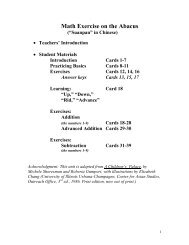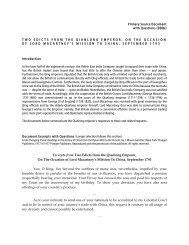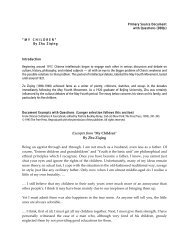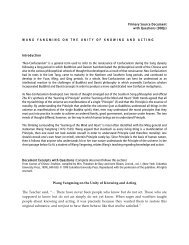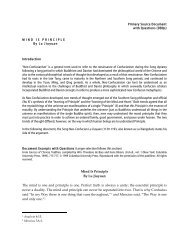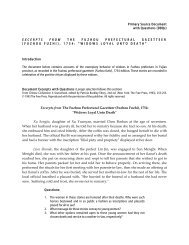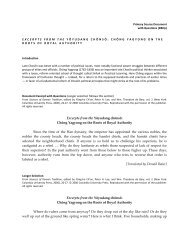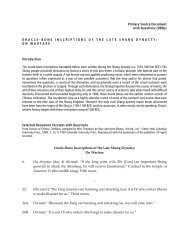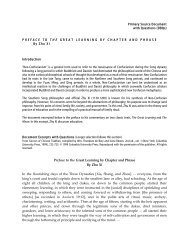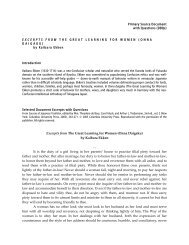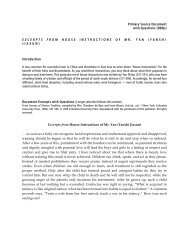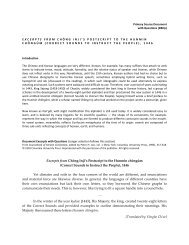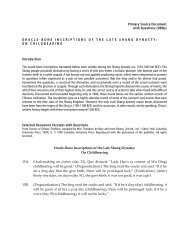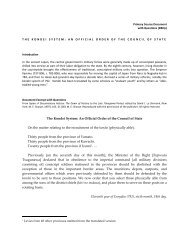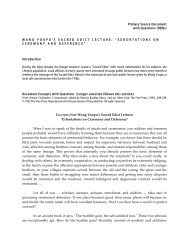Memorial on the Encouragement of Agriculture, by Chao Cuo [PDF]
Memorial on the Encouragement of Agriculture, by Chao Cuo [PDF]
Memorial on the Encouragement of Agriculture, by Chao Cuo [PDF]
Create successful ePaper yourself
Turn your PDF publications into a flip-book with our unique Google optimized e-Paper software.
Prim ar y S our ce Doc um e nt<br />
wi t h Qu e st io n s ( D BQ s)<br />
M E M O R I A L O N T H E E N C O U R A G E M E N T O F A G R I C U L T U R E<br />
B y C h a o C u o<br />
Int rod uct io n<br />
Chinese emperors and <strong>the</strong>ir <strong>of</strong>ficials were keenly aware <strong>of</strong> <strong>the</strong> importance <strong>of</strong> <strong>the</strong> agricultural ec<strong>on</strong>omy. A flourishing<br />
and well-managed agriculture meant a satisfied people and a large surplus, which <strong>the</strong> imperial government could<br />
use to support its rulers, bureaucrats, and armies and enable it to <strong>of</strong>fer famine relief from stored grain supplies when<br />
necessary. A weak and poorly managed agricultural ec<strong>on</strong>omy harmed not <strong>on</strong>ly <strong>the</strong> people, but also <strong>the</strong> emperor and<br />
his government.<br />
The Han Emperor Wen (r. 180-157 BCE) was evidently c<strong>on</strong>cerned about <strong>the</strong> stability and productivity <strong>of</strong> Chinese<br />
agriculture. Accordingly, he called up<strong>on</strong> his <strong>of</strong>ficials to devise systems <strong>of</strong> ec<strong>on</strong>omic management that would raise<br />
productivity and increase <strong>the</strong> government’s ability to extract and store surplus grain from <strong>the</strong> rural ec<strong>on</strong>omy. <strong>Chao</strong><br />
<strong>Cuo</strong>, a high-ranking <strong>of</strong>ficial, <strong>of</strong>fered <strong>the</strong> suggesti<strong>on</strong>s below in 178 BCE. Emperor Wen approved <strong>of</strong> <strong>the</strong>se suggesti<strong>on</strong>s<br />
and put <strong>the</strong>m into practice, with remarkably successful results.<br />
Docu m e n t E xc erpt s w it h Q ue s tio n s (Complete document follows this secti<strong>on</strong>)<br />
From Sources <strong>of</strong> Chinese Traditi<strong>on</strong>, compiled <strong>by</strong> Wm. Theodore de Bary and Irene Bloom, 2nd ed., vol. 1 (New York: Columbia<br />
University Press, 1999), 355-357. © 1999 Columbia University Press. Reproduced with <strong>the</strong> permissi<strong>on</strong> <strong>of</strong> <strong>the</strong> publisher. All rights<br />
reserved.<br />
<str<strong>on</strong>g>Memorial</str<strong>on</strong>g> <strong>on</strong> <strong>the</strong> <strong>Encouragement</strong> <strong>of</strong> <strong>Agriculture</strong> <br />
By <strong>Chao</strong> <strong>Cuo</strong> <br />
<br />
The reas<strong>on</strong> people never suffered from cold or famine under <strong>the</strong> rule <strong>of</strong> <strong>the</strong> sage kings was not <br />
that <strong>the</strong>se kings were capable <strong>of</strong> plowing to provide food or spinning to make clo<strong>the</strong>s for <strong>the</strong>m. <br />
It was that <strong>the</strong>y opened up for <strong>the</strong> people <strong>the</strong> way to wealth. Therefore although emperors Yao <br />
and Yu encountered nine years <strong>of</strong> flood and King Tang seven years <strong>of</strong> drought, <strong>the</strong>re were no <br />
derelicts or starving within <strong>the</strong> kingdom, because provisi<strong>on</strong>s had been stored up in plenty and <br />
all precauti<strong>on</strong> taken beforehand. <br />
<br />
Q ue st io n s:<br />
1. To what does <strong>Chao</strong> <strong>Cuo</strong> attribute <strong>the</strong> peace and prosperity <strong>of</strong> <strong>the</strong> era <strong>of</strong> <strong>the</strong><br />
“sage kings,” even in times <strong>of</strong> flood and drought? How does this square with<br />
C<strong>on</strong>fucian philosophy as you understand it?
Prim ar y S our ce Doc um e nt , wit h Qu e st io n s (D B Q s) <strong>on</strong><br />
ME M O RI A L ON T HE EN C OU R A GE ME NT OF A GRI CU LT URE, BY C HA O C U O<br />
Poverty is bred <strong>of</strong> insufficiency that is caused <strong>by</strong> lack <strong>of</strong> agriculture. If men do not farm, <strong>the</strong>y <br />
will not be tied to <strong>the</strong> land; and if <strong>the</strong>y are not tied to <strong>the</strong> land, <strong>the</strong>y will desert <strong>the</strong>ir villages, <br />
neglect <strong>the</strong>ir families, and become like birds and beasts. Then although <strong>the</strong>re be high walls and <br />
deep moats, strict laws and severe punishments, <strong>the</strong>y still cannot be held in check. When <strong>on</strong>e is <br />
cold he does not demand <strong>the</strong> most comfortable and warmest garments; when <strong>on</strong>e is starving he <br />
does not wait for <strong>the</strong> tastiest morsels. When a man is plagued <strong>by</strong> hunger and cold he has no <br />
regard for modesty or shame. <br />
Q ue st io n s:<br />
2. How does <strong>Chao</strong> <strong>Cuo</strong> explain poverty?<br />
3. Do you agree with him? Is this sort <strong>of</strong> explanati<strong>on</strong> relevant to accounting for<br />
<strong>the</strong> existence <strong>of</strong> poverty today? Why or why not?<br />
4. Any explanati<strong>on</strong> <strong>of</strong> a problem implies a particular soluti<strong>on</strong> or set <strong>of</strong><br />
soluti<strong>on</strong>s. What sort <strong>of</strong> soluti<strong>on</strong>s to poverty does <strong>Chao</strong> <strong>Cuo</strong>’s explanati<strong>on</strong><br />
point toward? If you were to accept <strong>the</strong> way in which <strong>Chao</strong> <strong>Cuo</strong> explains<br />
poverty in <strong>the</strong> Han as a valid strategy for explaining poverty in <strong>the</strong><br />
c<strong>on</strong>temporary world, <strong>the</strong>n what sort <strong>of</strong> soluti<strong>on</strong>s does that strategy imply<br />
today?<br />
<br />
Am<strong>on</strong>g <strong>the</strong> traders and merchants, <strong>on</strong> <strong>the</strong> o<strong>the</strong>r hand, <strong>the</strong> larger <strong>on</strong>es hoard goods and exact <br />
100 percent pr<strong>of</strong>it, while <strong>the</strong> smaller <strong>on</strong>es sit lined up in <strong>the</strong> markets selling <strong>the</strong>ir wares. Those <br />
who deal in luxury goods daily disport <strong>the</strong>mselves in <strong>the</strong> cities and market towns; taking <br />
advantage <strong>of</strong> <strong>the</strong> ruler’s wants, <strong>the</strong>y are able to sell at double price. Thus though <strong>the</strong>ir men <br />
nei<strong>the</strong>r plow nor weed, though <strong>the</strong>ir women nei<strong>the</strong>r tend silkworms nor spin, yet <strong>the</strong>ir clo<strong>the</strong>s <br />
are brightly patterned and colored, and <strong>the</strong>y eat <strong>on</strong>ly choice grain and meat. They have n<strong>on</strong>e <strong>of</strong> <br />
<strong>the</strong> hardships <strong>of</strong> <strong>the</strong> farmer, yet <strong>the</strong>ir grain is ten to <strong>on</strong>e hundredfold. With <strong>the</strong>ir wealth <strong>the</strong>y <br />
may c<strong>on</strong>sort with nobles, and <strong>the</strong>ir power exceeds <strong>the</strong> authority <strong>of</strong> government <strong>of</strong>ficials. They <br />
use <strong>the</strong>ir pr<strong>of</strong>its to overthrow o<strong>the</strong>rs. Over a thousand miles <strong>the</strong>y wander at ease, <strong>the</strong>ir caps and <br />
cart covers filling <strong>the</strong> roads. They ride in fine carriages and drive fat horses, tread in silken <br />
shoes and trail white silk behind <strong>the</strong>m. Thus it is that merchants encroach up<strong>on</strong> <strong>the</strong> farmers, <br />
and <strong>the</strong> farmers are driven from <strong>the</strong>ir homes and become vagrants. At present, although <strong>the</strong> <br />
laws degrade <strong>the</strong> merchants, <strong>the</strong> merchants have become wealthy and h<strong>on</strong>ored, and although <br />
<strong>the</strong>y h<strong>on</strong>or <strong>the</strong> farmers, <strong>the</strong> farmers have grown poor and lowly. Thus what comm<strong>on</strong> practice <br />
h<strong>on</strong>ors <strong>the</strong> ruler degrades, and what <strong>the</strong> <strong>of</strong>ficials scorn <strong>the</strong> law exalts. With ruler and ruled thus <br />
at variance and <strong>the</strong>ir desires in c<strong>on</strong>flict, it is impossible to hope that <strong>the</strong> nati<strong>on</strong> will become rich <br />
and <strong>the</strong> law be upheld. <br />
Q ue st io n s:<br />
5. After describing <strong>the</strong> suffering and poverty <strong>of</strong> <strong>the</strong> farmers, <strong>Chao</strong> <strong>Cuo</strong> embarks<br />
up<strong>on</strong> this c<strong>on</strong>trasting descripti<strong>on</strong> <strong>of</strong> merchants. For what reas<strong>on</strong>s does <strong>Chao</strong><br />
<strong>Cuo</strong> criticize merchants? Are his criticisms justified?<br />
As ia fo r E du cat ors | Colu m bia U niv ers it y | ht t p:/ /af e. ea s ia.colu m bia. e du Page 2 <strong>of</strong> 5
Prim ar y S our ce Doc um e nt , wit h Qu e st io n s (D B Q s) <strong>on</strong><br />
ME M O RI A L ON T HE EN C OU R A GE ME NT OF A GRI CU LT URE, BY C HA O C U O<br />
6. Why do you think <strong>the</strong> c<strong>on</strong>trast between merchants and farmers has<br />
developed to <strong>the</strong> point that it has in <strong>Chao</strong> <strong>Cuo</strong>’s descripti<strong>on</strong>?<br />
7. Do you agree that <strong>the</strong> situati<strong>on</strong> described <strong>by</strong> <strong>Chao</strong> <strong>Cuo</strong> (i.e. <strong>the</strong> disparity in<br />
wealth between merchants and <strong>the</strong> farmers, who are <strong>the</strong> majority <strong>of</strong> <strong>the</strong><br />
populati<strong>on</strong>) is a problem? If not, why not? If so, what would you suggest as a<br />
soluti<strong>on</strong>?<br />
<br />
Under <strong>the</strong> present circumstances <strong>the</strong>re is nothing more urgently needed than to make <strong>the</strong> <br />
people devote <strong>the</strong>mselves to agriculture. To accomplish this <strong>on</strong>e must enhance <strong>the</strong> value <strong>of</strong> <br />
grain. This may be d<strong>on</strong>e <strong>by</strong> making it possible for <strong>the</strong> people to use grain to obtain rewards and <br />
avoid punishments. If an order is sent out that all who send grain to <strong>the</strong> government shall <br />
obtain h<strong>on</strong>orary rank or pard<strong>on</strong> from crimes, <strong>the</strong>n wealthy men will acquire rank, <strong>the</strong> farmers <br />
will have m<strong>on</strong>ey, and grain will circulate freely. If men can afford to present grain in exchange <br />
for ranks, <strong>the</strong>y must have a surplus. If this surplus is acquired for <strong>the</strong> use <strong>of</strong> <strong>the</strong> ruler, <strong>the</strong>n <strong>the</strong> <br />
poll tax <strong>on</strong> <strong>the</strong> poor can be reduced. This is what is known as reducing <strong>the</strong> surplus to supply <strong>the</strong> <br />
deficiency. … Ranks are something that <strong>the</strong> ruler may dispense at will: he has <strong>on</strong>ly to speak and <br />
<strong>the</strong>re is no end to <strong>the</strong>m. Grain is something grown <strong>on</strong> <strong>the</strong> land <strong>by</strong> <strong>the</strong> people and its supply is <br />
c<strong>on</strong>tinuous. All men greatly desire to obtain high ranks and avoid penalties. If all are allowed to <br />
present grain for supplying <strong>the</strong> fr<strong>on</strong>tiers and <strong>the</strong>re<strong>by</strong> obtain rank or commutati<strong>on</strong> <strong>of</strong> penalties, <br />
<strong>the</strong>n in no more than three years <strong>the</strong>re will be plenty <strong>of</strong> grain for <strong>the</strong> border areas. <br />
Q ue st io n s:<br />
8. Read <strong>Chao</strong> <strong>Cuo</strong>’s recommendati<strong>on</strong> carefully. What assumpti<strong>on</strong>s about<br />
human nature underlie his proposed soluti<strong>on</strong> to <strong>the</strong> problem (i.e. poverty<br />
caused <strong>by</strong> insufficient producti<strong>on</strong> <strong>of</strong> grain)? From which school <strong>of</strong> classical<br />
Chinese philosophy are <strong>the</strong>se assumpti<strong>on</strong>s drawn?<br />
Comp l et e Doc um e nt<br />
From Sources <strong>of</strong> Chinese Traditi<strong>on</strong>, compiled <strong>by</strong> Wm. Theodore de Bary and Irene Bloom, 2nd ed., vol. 1 (New York: Columbia<br />
University Press, 1999), 355-357. © 1999 Columbia University Press. Reproduced with <strong>the</strong> permissi<strong>on</strong> <strong>of</strong> <strong>the</strong> publisher. All rights<br />
reserved.<br />
<str<strong>on</strong>g>Memorial</str<strong>on</strong>g> <strong>on</strong> <strong>the</strong> <strong>Encouragement</strong> <strong>of</strong> <strong>Agriculture</strong> <br />
By <strong>Chao</strong> <strong>Cuo</strong> <br />
<br />
The reas<strong>on</strong> people never suffered from cold or famine under <strong>the</strong> rule <strong>of</strong> <strong>the</strong> sage kings was not <br />
that <strong>the</strong>se kings were capable <strong>of</strong> plowing to provide food or spinning to make clo<strong>the</strong>s for <strong>the</strong>m. <br />
It was that <strong>the</strong>y opened up for <strong>the</strong> people <strong>the</strong> way to wealth. Therefore although emperors Yao <br />
and Yu encountered nine years <strong>of</strong> flood and King Tang seven years <strong>of</strong> drought, <strong>the</strong>re were no <br />
As ia fo r E du cat ors | Colu m bia U niv ers it y | ht t p:/ /af e. ea s ia.colu m bia. e du Page 3 <strong>of</strong> 5
Prim ar y S our ce Doc um e nt , wit h Qu e st io n s (D B Q s) <strong>on</strong><br />
ME M O RI A L ON T HE EN C OU R A GE ME NT OF A GRI CU LT URE, BY C HA O C U O<br />
derelicts or starving within <strong>the</strong> kingdom, because provisi<strong>on</strong>s had been stored up in plenty and <br />
all precauti<strong>on</strong> taken beforehand. <br />
<br />
Now all within <strong>the</strong> seas are united. The plenitude <strong>of</strong> land and people is not inferior to that <strong>of</strong> <br />
Tang and Yu, and in additi<strong>on</strong> we have not suffered from natural calamities <strong>of</strong> flood or drought <br />
for several years. Why <strong>the</strong>n are <strong>the</strong> stores <strong>of</strong> supplies so inferior? Because <strong>the</strong> land has benefits <br />
that have been overlooked and <strong>the</strong> people have untapped energies. There is still land suitable <br />
for growing grain that has not been brought under cultivati<strong>on</strong>, resources <strong>of</strong> hills and lakes that <br />
have not been exploited, and vagrants who have not yet returned to agricultural pursuits. When <br />
<strong>the</strong> people are in poverty, <strong>the</strong>n crime and evil‐doing are born. Poverty is bred <strong>of</strong> insufficiency <br />
that is caused <strong>by</strong> lack <strong>of</strong> agriculture. If men do not farm, <strong>the</strong>y will not be tied to <strong>the</strong> land; and if <br />
<strong>the</strong>y are not tied to <strong>the</strong> land, <strong>the</strong>y will desert <strong>the</strong>ir villages, neglect <strong>the</strong>ir families, and become <br />
like birds and beasts. Then although <strong>the</strong>re be high walls and deep moats, strict laws and severe <br />
punishments, <strong>the</strong>y still cannot be held in check. <br />
<br />
When <strong>on</strong>e is cold he does not demand <strong>the</strong> most comfortable and warmest garments; when <strong>on</strong>e <br />
is starving he does not wait for <strong>the</strong> tastiest morsels. When a man is plagued <strong>by</strong> hunger and cold <br />
he has no regard for modesty or shame. It is <strong>the</strong> nature <strong>of</strong> man that if he does not eat twice a <br />
day he will starve, and if in <strong>the</strong> course <strong>of</strong> a year he cuts himself no new clo<strong>the</strong>s he will freeze. <br />
When <strong>the</strong> belly is famished and gets no food, when <strong>the</strong> skin is chilled and has no clothing to <br />
cover it, <strong>the</strong>n even <strong>the</strong> most compassi<strong>on</strong>ate fa<strong>the</strong>r cannot provide for his own child. How <strong>the</strong>n <br />
can <strong>the</strong> ruler keep <strong>the</strong> allegiance <strong>of</strong> his people? An enlightened ruler, realizing this, will <br />
encourage his people in agriculture and sericulture, lighten <strong>the</strong> poll tax and o<strong>the</strong>r levies, <br />
increase his store <strong>of</strong> supplies and fill his granaries in preparati<strong>on</strong> for flood and drought. <br />
There<strong>by</strong> he can keep and care for his people. The people may <strong>the</strong>n be led <strong>by</strong> <strong>the</strong> ruler, for <strong>the</strong>y <br />
will follow after pr<strong>of</strong>it in any directi<strong>on</strong> like water flowing downward. <br />
<br />
Now pearls, jewels, gold, and silver can nei<strong>the</strong>r allay hunger nor keep out <strong>the</strong> cold, and yet <strong>the</strong> <br />
people all hold <strong>the</strong>m dear because <strong>the</strong>se are things used <strong>by</strong> <strong>the</strong> ruler. They are light and easy to <br />
store, and <strong>on</strong>e who holds <strong>the</strong>m in his grasp may roam <strong>the</strong> world and never fear hunger or cold. <br />
They cause ministers lightly to turn <strong>the</strong>ir backs up<strong>on</strong> <strong>the</strong>ir lords and <strong>the</strong> people easily to leave <br />
<strong>the</strong>ir villages; <strong>the</strong>y provide an incentive for thieves and a light form <strong>of</strong> wealth for fugitives. <br />
<br />
Grains and fibers, <strong>on</strong> <strong>the</strong> o<strong>the</strong>r hand, are produced from <strong>the</strong> land, nurtured through <strong>the</strong> seas<strong>on</strong>s, <br />
and harvested with labor; <strong>the</strong>y cannot be gotten in a day. Several measures <strong>of</strong> grain or cloth are <br />
too heavy for an average man to carry and so provide no reward for crime or evil. Yet if people <br />
go without <strong>the</strong>m for <strong>on</strong>e day <strong>the</strong>y will face hunger and cold. Therefore an enlightened ruler <br />
esteems <strong>the</strong> five grains and despises gold and jewels. <br />
<br />
At present in a farming family <strong>of</strong> five not fewer than two are required to perform labor service <br />
[for <strong>the</strong> state], while those who are left to work <strong>the</strong> farm are given no more than <strong>on</strong>e hundred <br />
mu <strong>of</strong> land, <strong>the</strong> yield <strong>of</strong> which is not over <strong>on</strong>e hundred piculs. … No matter how diligently <strong>the</strong>y <br />
As ia fo r E du cat ors | Colu m bia U niv ers it y | ht t p:/ /af e. ea s ia.colu m bia. e du Page 4 <strong>of</strong> 5
Prim ar y S our ce Doc um e nt , wit h Qu e st io n s (D B Q s) <strong>on</strong><br />
ME M O RI A L ON T HE EN C OU R A GE ME NT OF A GRI CU LT URE, BY C HA O C U O<br />
work nor what hardships <strong>the</strong>y suffer, <strong>the</strong>y still must face <strong>the</strong> calamities <strong>of</strong> flood and drought, <br />
emergency government measures, inordinate tax levies, and taxes collected out <strong>of</strong> seas<strong>on</strong>. <br />
Orders issued in <strong>the</strong> morning are changed before nightfall. Faced with such levies, <strong>the</strong> people <br />
must sell what <strong>the</strong>y have at half price in order to pay, and those who have nothing must take <br />
m<strong>on</strong>ey <strong>of</strong>fered at 100 percent interest. Thus <strong>the</strong>y are forced to sell <strong>the</strong>ir fields and houses, vend <br />
<strong>the</strong>ir children and grandchildren, to pay <strong>the</strong>ir debts. <br />
<br />
Am<strong>on</strong>g <strong>the</strong> traders and merchants, <strong>on</strong> <strong>the</strong> o<strong>the</strong>r hand, <strong>the</strong> larger <strong>on</strong>es hoard goods and exact <br />
100 percent pr<strong>of</strong>it, while <strong>the</strong> smaller <strong>on</strong>es sit lined up in <strong>the</strong> markets selling <strong>the</strong>ir wares. Those <br />
who deal in luxury goods daily disport <strong>the</strong>mselves in <strong>the</strong> cities and market towns; taking <br />
advantage <strong>of</strong> <strong>the</strong> ruler’s wants, <strong>the</strong>y are able to sell at double price. Thus though <strong>the</strong>ir men <br />
nei<strong>the</strong>r plow nor weed, though <strong>the</strong>ir women nei<strong>the</strong>r tend silkworms nor spin, yet <strong>the</strong>ir clo<strong>the</strong>s <br />
are brightly patterned and colored, and <strong>the</strong>y eat <strong>on</strong>ly choice grain and meat. They have n<strong>on</strong>e <strong>of</strong> <br />
<strong>the</strong> hardships <strong>of</strong> <strong>the</strong> farmer, yet <strong>the</strong>ir grain is ten to <strong>on</strong>e hundredfold. With <strong>the</strong>ir wealth <strong>the</strong>y <br />
may c<strong>on</strong>sort with nobles, and <strong>the</strong>ir power exceeds <strong>the</strong> authority <strong>of</strong> government <strong>of</strong>ficials. They <br />
use <strong>the</strong>ir pr<strong>of</strong>its to overthrow o<strong>the</strong>rs. Over a thousand miles <strong>the</strong>y wander at ease, <strong>the</strong>ir caps and <br />
cart covers filling <strong>the</strong> roads. They ride in fine carriages and drive fat horses, tread in silken <br />
shoes and trail white silk behind <strong>the</strong>m. Thus it is that merchants encroach up<strong>on</strong> <strong>the</strong> farmers, <br />
and <strong>the</strong> farmers are driven from <strong>the</strong>ir homes and become vagrants. <br />
<br />
At present, although <strong>the</strong> laws degrade <strong>the</strong> merchants, <strong>the</strong> merchants have become wealthy and <br />
h<strong>on</strong>ored, and although <strong>the</strong>y h<strong>on</strong>or <strong>the</strong> farmers, <strong>the</strong> farmers have grown poor and lowly. Thus <br />
what comm<strong>on</strong> practice h<strong>on</strong>ors <strong>the</strong> ruler degrades, and what <strong>the</strong> <strong>of</strong>ficials scorn <strong>the</strong> law exalts. <br />
With ruler and ruled thus at variance and <strong>the</strong>ir desires in c<strong>on</strong>flict, it is impossible to hope that <br />
<strong>the</strong> nati<strong>on</strong> will become rich and <strong>the</strong> law be upheld. <br />
<br />
Under <strong>the</strong> present circumstances <strong>the</strong>re is nothing more urgently needed than to make <strong>the</strong> <br />
people devote <strong>the</strong>mselves to agriculture. To accomplish this <strong>on</strong>e must enhance <strong>the</strong> value <strong>of</strong> <br />
grain. This may be d<strong>on</strong>e <strong>by</strong> making it possible for <strong>the</strong> people to use grain to obtain rewards and <br />
avoid punishments. If an order is sent out that all who send grain to <strong>the</strong> government shall <br />
obtain h<strong>on</strong>orary rank or pard<strong>on</strong> from crimes, <strong>the</strong>n wealthy men will acquire rank, <strong>the</strong> farmers <br />
will have m<strong>on</strong>ey, and grain will circulate freely. If men can afford to present grain in exchange <br />
for ranks, <strong>the</strong>y must have a surplus. If this surplus is acquired for <strong>the</strong> use <strong>of</strong> <strong>the</strong> ruler, <strong>the</strong>n <strong>the</strong> <br />
poll tax <strong>on</strong> <strong>the</strong> poor can be reduced. This is what is known as reducing <strong>the</strong> surplus to supply <strong>the</strong> <br />
deficiency. … Ranks are something that <strong>the</strong> ruler may dispense at will: he has <strong>on</strong>ly to speak and <br />
<strong>the</strong>re is no end to <strong>the</strong>m. Grain is something grown <strong>on</strong> <strong>the</strong> land <strong>by</strong> <strong>the</strong> people and its supply is <br />
c<strong>on</strong>tinuous. All men greatly desire to obtain high ranks and avoid penalties. If all are allowed to <br />
present grain for supplying <strong>the</strong> fr<strong>on</strong>tiers and <strong>the</strong>re<strong>by</strong> obtain rank or commutati<strong>on</strong> <strong>of</strong> penalties, <br />
<strong>the</strong>n in no more than three years <strong>the</strong>re will be plenty <strong>of</strong> grain for <strong>the</strong> border areas. <br />
<br />
<br />
As ia fo r E du cat ors | Colu m bia U niv ers it y | ht t p:/ /af e. ea s ia.colu m bia. e du Page 5 <strong>of</strong> 5


![Memorial on the Encouragement of Agriculture, by Chao Cuo [PDF]](https://img.yumpu.com/28866998/1/500x640/memorial-on-the-encouragement-of-agriculture-by-chao-cuo-pdf.jpg)
